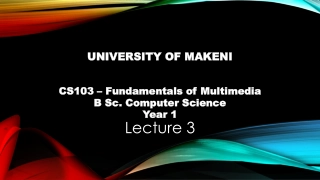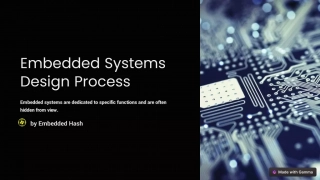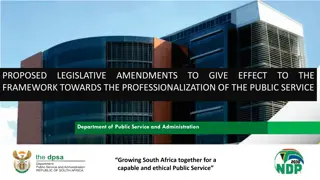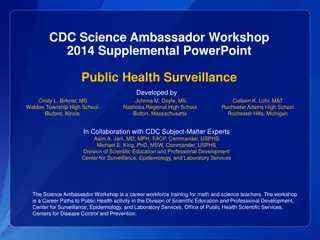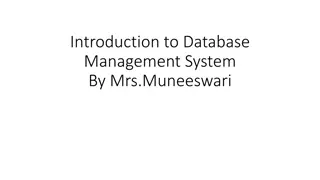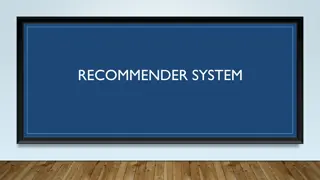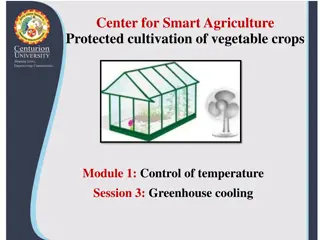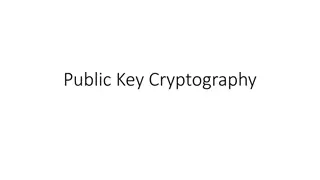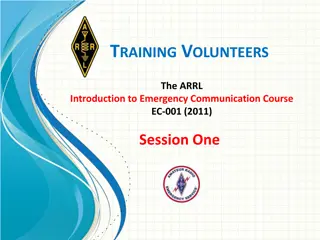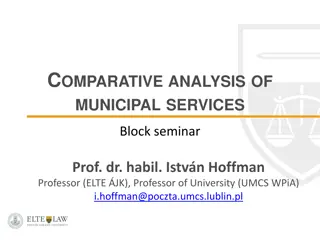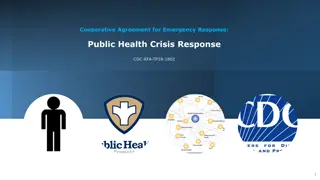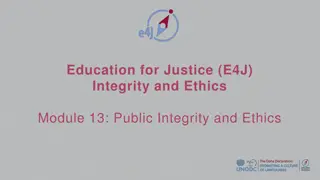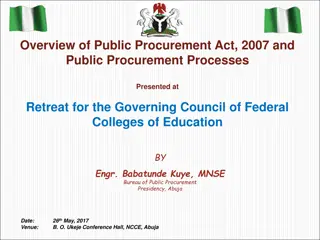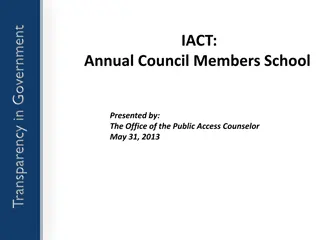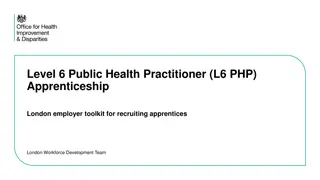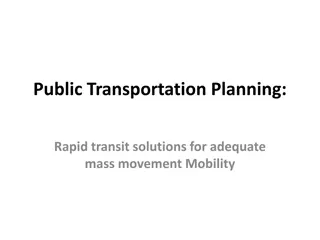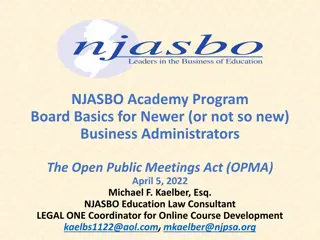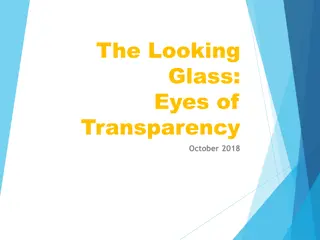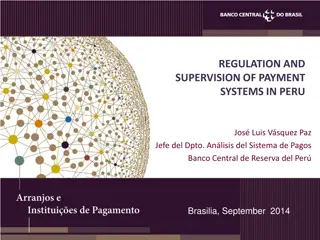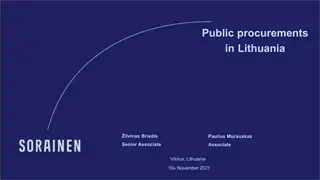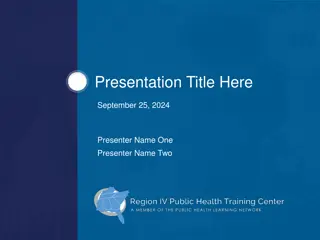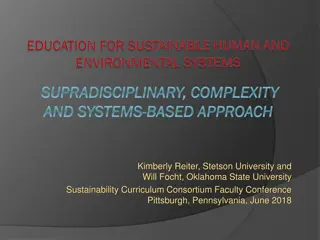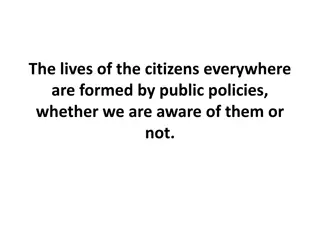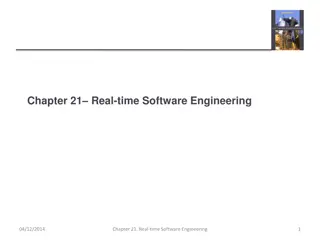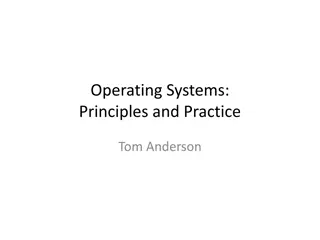Understanding Multimedia Systems: Hardware and Software Components
Multimedia systems require specific hardware and software components to meet the demands of producing and playing multimedia content. Development systems are used for creating content with higher specifications, while playback systems are used for playing multimedia files with lower specifications.
8 views • 46 slides
Embedded Systems Design Process in the Embedded systems
Embedded systems are all around us, from the tiny microcontrollers in our household appliances to the sophisticated control systems in cars and aeroplanes. But how are these systems designed? Let's delve into the basics of the embedded systems design process in simple terms that anyone can understan
2 views • 9 slides
Importance of Public Sector Auditing in Enhancing Accountability and Governance
The Auditor-General of South Africa plays a critical role in strengthening democracy through auditing public sector institutions. Public sector auditing ensures compliance, performance evaluation, and governance transparency, ultimately building public confidence. Key stakeholders include government
1 views • 11 slides
Proposed Legislative Amendments for Professionalization of Public Service
This presentation outlines proposed legislative reforms to enhance the professionalization of the public service in South Africa. Key areas targeted include managing the political-administrative interface, training and development of employees, promoting ethical conduct, and more. Priority legislati
1 views • 8 slides
Overview of Distributed Systems: Characteristics, Classification, Computation, Communication, and Fault Models
Characterizing Distributed Systems: Multiple autonomous computers with CPUs, memory, storage, and I/O paths, interconnected geographically, shared state, global invariants. Classifying Distributed Systems: Based on synchrony, communication medium, fault models like crash and Byzantine failures. Comp
9 views • 126 slides
Operating Systems
An operating system is a crucial program that manages all other programs on a computer. It handles tasks like input recognition, file management, and device control. There are different types of operating systems such as single-user, single-task systems, multi-user, multi-task systems, real-time ope
6 views • 11 slides
Understanding Information Systems in Organizational Management
Management in organizations is divided into three levels: operational, tactical, and strategic. Each level requires different information systems to support various activities. Operational systems focus on routine transactions and control processes, while middle-level systems aid in semi-structured
9 views • 39 slides
India Alliance Clinical & Public Health fellowship in India
India Alliance Clinical & Public Health fellowship in India\n\nIndia Alliance Clinical and Public Health Research Fellowships are for Health researchers with an MD, MS, MPH, or an equivalent clinical or public health degree, who can apply for the DBT\/Wellcome Trust India Alliance Clinical and Publi
0 views • 5 slides
Introduction to Public Health Surveillance
Public health surveillance is essential in monitoring and analyzing health concerns that affect the entire nation. From infectious disease outbreaks to chronic illnesses and environmental disasters, public health aims to improve overall health and well-being. This presentation serves as an informati
0 views • 19 slides
Introduction to Database Management System Explained
This presentation covers the basics of database management systems, including definitions of data, types of data, structured and unstructured data, storing data in computers using file systems and database systems, and issues with file systems like data redundancy, inconsistency, difficult data acce
1 views • 18 slides
Understanding Different Types of Recommender Systems
Recommender systems play a crucial role in providing personalized recommendations to users. This article delves into various types of recommender systems including Collaborative Filtering, Content-Based, Knowledge-Based, and Group Recommender Systems. Collaborative Filtering involves making predicti
0 views • 7 slides
Efficient Greenhouse Cooling Systems for Smart Agriculture
Active summer cooling systems like fan-and-pad and fog systems are crucial for maintaining optimal temperatures in greenhouses. These systems work by utilizing evaporation to remove heat from the air. Fan-and-pad cooling systems have been in use since 1954, where water is passed through pads to cool
1 views • 23 slides
Introduction to Public Key Cryptography
Public key cryptography, exemplified by algorithms like Diffie-Hellman and RSA, revolutionizes secure communication by allowing users to encrypt messages with public keys known to all and decrypt them with private keys known only to the intended recipient. This advanced encryption method ensures sec
1 views • 44 slides
Understanding Emergency Communication Systems for Volunteer Training
This content covers various topics related to emergency communication systems for volunteer training, including agency communication systems, government radio systems for police and fire departments, emergency medical radio systems, American Red Cross frequencies, and types of served-agency radio sy
2 views • 29 slides
Introduction to Embedded Systems Design
Embedded Systems Design, Chapter 1 provides an insightful overview of embedded systems, distinguishing them from general-purpose computers. The chapter delves into the characteristics of embedded systems, their design considerations, and the various types of embedded computers such as general-purpos
1 views • 7 slides
Comparative Analysis of Municipal Services in Public Sector Evolution
Explore the evolution and role of public services in the municipal sector through a comparative analysis presented in a block seminar by Prof. István Hoffman. Delve into the general theory of public services, the traditional and changing approaches of public administration, and government expenditu
0 views • 74 slides
Enhancing Public Health Workforce for COVID-19 Response Grant Program
This cooperative agreement aims to strengthen public health departments by expanding staff, hiring school nurses, and developing public health leaders. It includes major goals like creating a Public Health AmeriCorps and modernizing the public health workforce. The grant terms specify funding distri
1 views • 17 slides
Understanding Judicial Review in Suing Public Authorities
Judicial review is the inherent right of courts to review decision-making processes of public bodies. It allows for challenging and analyzing decisions, granting public law remedies like declaration, certiorari, mandamus, prohibition, and quo warranto. Those adversely affected by public duty actions
0 views • 13 slides
Exploring Public Integrity and Ethics in Civil Service
This module on public integrity and ethics delves into key instruments for strengthening ethical practices in public organizations, challenges faced, analyzing codes of ethics, and managing integrity risks. The agenda includes activities like structured ethical reflection, understanding public value
1 views • 13 slides
Understanding Public Procurement Processes and the Public Procurement Act of 2007
Public procurement involves the systematic acquisition of goods, works, and services using public funds through a fair and transparent process. The Public Procurement Act of 2007 outlines the procedures for procurement, ensuring value for money, efficiency, and equity. This process aims to instill p
0 views • 37 slides
Understanding Indiana's Open Door Law: Public Access and Governance
The Indiana Open Door Law ensures transparency in public agency actions by requiring open meetings unless exempted. The Public Access Counselor provides guidance on public access laws, emphasizing the importance of public information accessibility. Meetings under the law must be open to the public,
0 views • 17 slides
Understanding the Role of Public Health Practitioners in London's Workforce Development
Public Health Practitioners (PHPs) play a crucial role in implementing and delivering public health services, programs, and interventions. They focus on promoting health and wellbeing within communities, addressing health inequalities, and protecting the public from environmental hazards. Learn abou
0 views • 23 slides
Understanding Public Goods in Higher Education
This text delves into the concept of public goods in higher education, examining the distinctions between public and private forms, the economic and political dimensions, and the normative value of public goods. It discusses the economic definition of public goods, emphasizing their non-rivalrous an
1 views • 18 slides
Efficient Public Transportation Planning for Mass Mobility
Rapid transit solutions like high-capacity public transportation systems, including overground rail, underground rail, trams, and BRT systems, play a crucial role in enhancing mass movement efficiency. Factors such as journey time, transport costs, vehicle operating costs, and the benefits of rapid
1 views • 20 slides
Understanding New Jersey's Open Public Meetings Act (OPMA)
This presentation outlines the Open Public Meetings Act (OPMA) in New Jersey, emphasizing the importance of public access to government meetings and decision-making processes. Sen. Byron M. Baer's Sunshine Law ensures transparency and democracy by allowing the public to attend and observe public bod
0 views • 66 slides
Information Systems in Organizations: Overview and Implementation
Information systems play a crucial role in organizations, encompassing transaction processing systems, functional area information systems, and enterprise resource planning systems. This content delves into the purpose of transaction processing systems, the support provided by information systems ac
0 views • 30 slides
Enhancing Public Services through Open Government Partnership in Georgia
The National Agency of State Property in Georgia, in partnership with the Open Government Partnership (OGP) and supported by the United Nations Development Programme (UNDP), has undertaken a project to improve transparency, accountability, and citizen engagement in public services. The 2014-2015 Act
0 views • 9 slides
Ensuring Transparency in Public Governance: The Brown Act and Public Records Act
This content emphasizes the importance of transparency in public governance by discussing key laws such as the Brown Act and Public Records Act. It highlights the necessity for public officials to conduct business transparently, allowing the public to monitor and participate in decision-making proce
0 views • 22 slides
Regulation and Supervision of Payment Systems in Peru
Peru has seen significant economic growth and stability from 2004 to 2013, enhancing confidence in the payment system. The Central Reserve Bank of Peru plays a crucial role in ensuring systemic stability, oversight, and efficiency in payment systems. Supervision is necessary to safeguard public obje
0 views • 24 slides
Understanding the Role of Public Opinion in the Political Process
The political process involves the interaction of public opinion, interest groups, and political parties. Public opinion, shaped by factors like media and socialization, influences government actions. This chapter discusses the significance of public opinion, its formation, and measurement through p
0 views • 39 slides
Overview of Public Procurement System in Lithuania
The public procurement system in Lithuania is governed by various laws and regulations, covering different sectors such as concessions, defense/security, utilities, and classical sector. The system includes procedures for different monetary value procurements, including international, simplified, an
0 views • 44 slides
Region IV Public Health Training Center Overview
The Region IV Public Health Training Center (PHTC) is dedicated to strengthening the competence of the public health workforce in HHS Region IV. It provides professional development opportunities for both current and future public health professionals through training programs, field placements, and
0 views • 33 slides
Understanding Cascade Control Systems in Industrial Processes
Cascade control systems play a crucial role in improving process control efficiency by incorporating feedback loops within feedback loops. This type of control architecture helps to better handle disturbances and variations in the process by creating secondary loops that monitor specific parameters.
0 views • 8 slides
Sustainable Education for Human and Environmental Systems
Sustainable Education for Human and Environmental Systems (SHES) focuses on fostering sustainable societies through social learning and systems thinking. It aims to promote interconnectedness between human and environmental systems, with a vision of enhancing well-being while maintaining the viabili
0 views • 19 slides
Understanding Public Services in Modern Democracies
Public services play a crucial role in modern democracies, encompassing a wide range of essential services provided by the government to its citizens. These services, whether directly provided or publicly financed, are integral to ensuring equal access and upholding fundamental human rights. Public
0 views • 10 slides
Evolution of Public Policy: From Seeds Sown in 1940s to Academic Discipline in Social Science
The lives of citizens are shaped by public policies, often unnoticed. The analysis of current public policy in America carries a unique 20th-century essence. Beginning in the 1940s, these policy seeds have profoundly influenced government and academic institutions. By the early 1950s, public policy
0 views • 6 slides
Public Library Structure and Funding in New Jersey
Public libraries in New Jersey are established through referendums for municipal, joint municipal, and county systems. Association libraries operate under the Nonprofit Corporation Act, becoming public by accepting public funds. The governance includes municipal and joint municipal library boards, a
0 views • 33 slides
Understanding Embedded Systems and Cyber-Physical Systems
Embedded systems are specialized computer systems embedded within larger systems, such as control systems and car controllers. This lecture covers real-time aspects, applications of Cyber-Physical Systems (CPS), and examples like the Boeing 777/Airbus A380 cockpit. It discusses the design process of
0 views • 22 slides
Understanding Real-time Software Engineering for Embedded Systems
Embedded systems play a crucial role in controlling various machines and processes. Real-time software engineering focuses on designing systems that respond instantly to events, ensuring correctness and timeliness. Characteristics like continuous operation, unpredictable environment interactions, an
0 views • 59 slides
Understanding Operating Systems: Principles and Practice in CSE Curriculum
Dive into the world of operating systems through the lens of "Operating Systems: Principles and Practice" by Tom Anderson. Discover how this course fits in the UW CSE curriculum, covering systems programming, operating system interfaces, and distributed systems. Explore the project work on building
0 views • 21 slides
